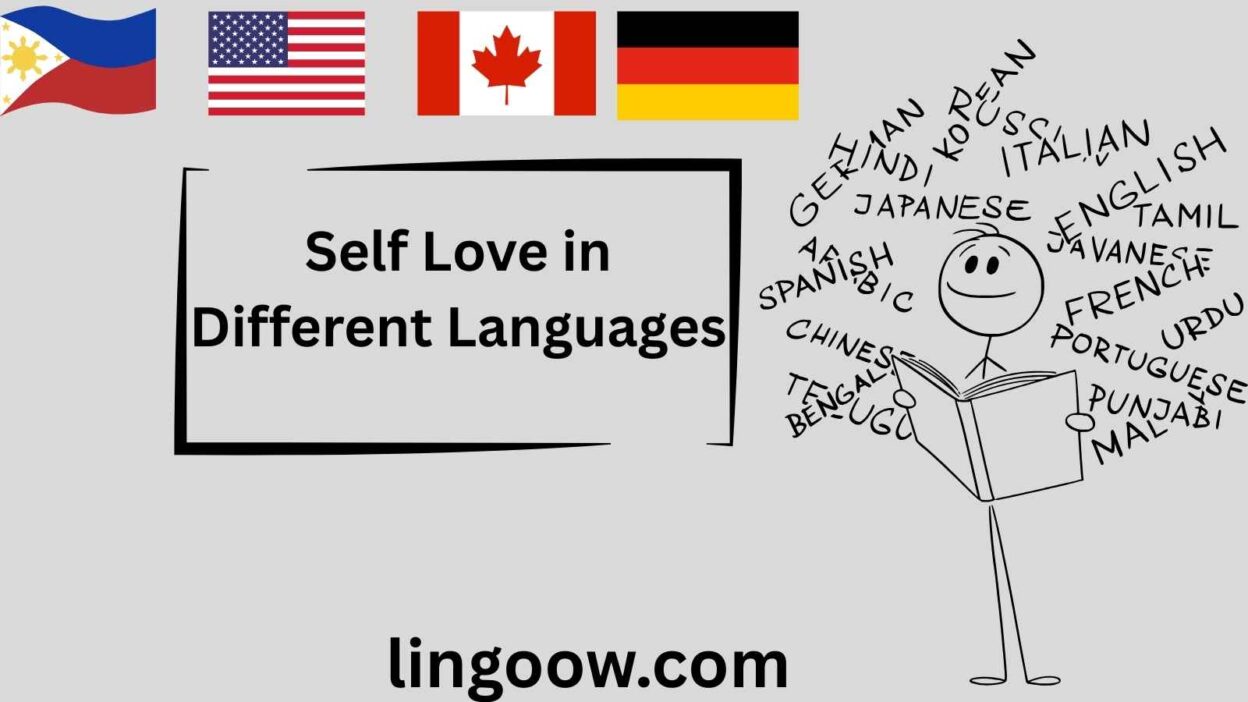When I was a teenager, I remember sitting in my room, staring at the mirror, and struggling to find something to love about myself. It was a quiet moment, but it felt deafening—like the world was shouting at me to be better, thinner, smarter.
Years later, while traveling through a small village in Italy, I met an elderly woman who taught me the phrase amare se stessi. She said it with such warmth, as if loving oneself was as natural as breathing. That moment sparked a curiosity in me: how do people across the globe express the idea of self-love? What words do they use, and what stories do those words carry?
Self-love is a universal concept, yet it’s woven into the fabric of each culture in unique ways. It’s a quiet strength, a radical act of embracing who you are, flaws and all. From the bustling streets of Tokyo to the vibrant markets of Nairobi, the idea of self-love transcends borders, but its expression is as diverse as the people who speak it. In this blog post, we’ll explore how self-love is articulated in different languages and cultures, uncovering the beauty of its universal resonance and the nuances that make each expression special.
Reference Table: Self-Love Across Languages
Below is a table showcasing how “self-love” is expressed in various languages, along with cultural or linguistic insights.
| Language | Word/Phrase for Self-Love | Cultural/Linguistic Insight |
| French | Amour de soi | Emphasizes a deep, personal affection for oneself, often tied to French philosophies of individualism. |
| Spanish | Amor propio | Reflects pride and self-respect, deeply rooted in Latin American and Spanish cultures. |
| Italian | Amare se stessi | Suggests an active, ongoing process of self-acceptance, celebrated in Italy’s culture of beauty and passion. |
| German | Selbstliebe | A straightforward term that reflects Germany’s pragmatic approach to emotional well-being. |
| Mandarin | Zì ài (自爱) | Combines “self” and “love,” emphasizing personal dignity in Chinese Confucian values. |
| Hindi | Swayam-prem (स्वयं प्रेम) | Highlights self-love as a spiritual act, tied to India’s traditions of inner peace. |
| Japanese | Jiko ai (自己愛) | Often associated with balance and mindfulness in Japan’s collectivist culture. |
| Korean | Jagi sarang (자기 사랑) | A gentle term, reflecting Korea’s growing focus on mental health and self-care. |
| Arabic | Hubb al-dhāt (حب الذات) | Used across Arab cultures, it conveys self-respect with a nod to communal harmony. |
| Swahili | Kujipenda | A term that celebrates self-acceptance, common in East African communities. |
| Zulu | Ukuzithanda | Emphasizes self-care as a form of strength in South African Zulu culture. |
| Yoruba | Ìfẹ́ ara ẹni | Reflects a communal yet personal love, rooted in Nigeria’s Yoruba traditions. |
| Maori | Aroha ki a koe ano | A deeply spiritual term, tied to New Zealand’s Maori values of connection and respect. |
| Hawaiian | Aloha iā ʻoe iho | Embodies the Hawaiian spirit of aloha, extending love inward as well as outward. |
| Cherokee | Gvgeyu’i | A term for love that includes self, reflecting Cherokee values of harmony with oneself and nature. |
European Languages: A Tapestry of Self-Love
In Europe, self-love is often tied to philosophies of individualism and personal growth. In French, amour de soi carries a poetic weight, evoking the idea of cherishing oneself as one would a lover. French culture, with its emphasis on art and introspection, views self-love as a cornerstone of a fulfilling life. Think of Parisian cafes where philosophers like Rousseau debated the balance between self-love and societal duty.
In Spanish, amor propio is more than just love—it’s about pride and dignity. In Spain and Latin America, this term is often invoked in moments of resilience, like standing tall after a setback. It’s the fire in the eyes of a flamenco dancer, embodying self-respect through every move.
Italian amare se stessi suggests a lifelong journey. Italians, with their zest for life, see self-love as a daily practice—whether it’s savoring a home-cooked meal or dressing with confidence. In German, Selbstliebe is pragmatic yet profound, reflecting a culture that values emotional clarity and mental health. Germans might pair this with Selbstfürsorge (self-care), emphasizing practical steps to nurture oneself.
Asian Languages: Harmony and Inner Peace
Asia’s diverse cultures offer unique perspectives on self-love, often blending individual well-being with collective harmony. In Mandarin, zì ài (自爱) is rooted in Confucian values, where self-love is less about ego and more about cultivating personal virtue to contribute to society. In China, this might manifest in quiet moments of reflection, like practicing tai chi at dawn.
In Hindi, swayam-prem (स्वयं प्रेम) carries a spiritual undertone. In India, self-love is often linked to yoga and meditation, where loving oneself is a path to connecting with the divine. Japanese jiko ai (自己愛) reflects a culture that values balance. While Japan’s collectivist society emphasizes group harmony, self-love is seen as a way to maintain inner strength, like a samurai honing their spirit.
In Korean, jagi sarang (자기 사랑) has gained traction with the rise of self-care trends, especially among younger generations. K-pop stars and influencers often promote self-love as a form of empowerment. In Arabic, hubb al-dhāt (حب الذات) is used across 22 Arab countries, from Morocco to Iraq. It emphasizes self-respect while maintaining ties to family and community, reflecting the region’s collectivist ethos.
African Languages: Strength in Self-Acceptance
Africa’s linguistic diversity offers rich expressions of self-love, often tied to community and resilience. In Swahili, kujipenda is a vibrant term used across East Africa, from Kenya to Tanzania. It’s about embracing oneself fully, much like the communal joy of a Swahili wedding dance. In Zulu, ukuzithanda reflects strength and self-care, a value celebrated in South Africa’s tight-knit communities.
In Yoruba, spoken in Nigeria and Benin, ìfẹ́ ara ẹni emphasizes love as a communal act that starts with oneself. Yoruba culture, with its rich oral traditions, sees self-love as a foundation for uplifting others. Across Africa’s 54 countries, self-love is often expressed through storytelling, music, and dance, where personal pride strengthens the collective spirit.
Indigenous & Island Languages: Connection to Spirit and Land
Indigenous and island cultures offer profound insights into self-love, often tied to spirituality and nature. In Maori, aroha ki a koe ano reflects New Zealand’s values of connection. Maori culture sees self-love as part of aroha, a love that extends to family, community, and the land. In Hawaiian, aloha iā ʻoe iho embodies the spirit of aloha, where self-love is inseparable from loving others and the environment.
In Cherokee, gvgeyu’i reflects a holistic view of love, where caring for oneself strengthens ties to the community and nature. Spoken in parts of the United States, this term carries the weight of resilience against historical challenges. In Samoan, alofa ia te oe lava emphasizes self-love as a source of strength in Pacific Island cultures, where community and personal pride are intertwined.
Across indigenous cultures in countries like Australia, Canada, and the Pacific Islands, self-love is often expressed through rituals, storytelling, and a deep connection to the land.
Cultural Insights: A Historical Tapestry
The concept of self-love has evolved across civilizations, shaped by philosophy, religion, and history. In ancient Greece, philosophers like Aristotle spoke of philia (friendship) with oneself as essential for a virtuous life. In Hinduism, self-love is tied to atman, the inner self, which is revered as divine. Buddhist teachings emphasize self-compassion as a path to enlightenment, a concept echoed in modern mindfulness practices.
In African traditions, self-love often emerges in oral histories, where heroes embrace their strengths to uplift their communities. In indigenous cultures, self-love is inseparable from respect for ancestors and the land, a value passed down through generations. Over time, self-love has shifted from a philosophical ideal to a global movement, amplified by social media and mental health advocacy.
Proverbs: Wisdom in Words
Here are some proverbs and sayings about self-love from around the world:
- French: “S’aimer soi-même est le début d’une histoire d’amour qui dure toute la vie.” (To love oneself is the beginning of a lifelong romance.) – A nod to Oscar Wilde, adapted in French culture.
- Hindi: “Apne aap se pyar karo, tabhi duniya tumse pyar karegi.” (Love yourself, only then will the world love you.) – Reflects India’s spiritual wisdom.
- Swahili: “Kujipenda ni nguvu ya kwanza.” (Loving yourself is the first strength.) – A common saying in East Africa.
- Maori: “Kia aroha ki a koe ano, ka taea e koe te aroha ki etahi atu.” (Love yourself, and you can love others.) – Emphasizes interconnectedness.
- Arabic: “Man ahabba nafsahu, ahabba al-ākharīn.” (He who loves himself can love others.) – Highlights balance in Arab culture.
FAQs: Exploring Self-Love
Why does self-love sound similar in many languages?
Many languages share linguistic roots, like Latin for European languages (amor, amour, amare) or shared cultural values, like collectivism in Asian and African languages, which shape similar expressions.
What’s the oldest known usage of self-love?
The concept appears in ancient texts, like Aristotle’s Nicomachean Ethics (4th century BCE), where he discusses self-love as a virtue. In Eastern traditions, Hindu and Buddhist texts from the same era emphasize self-compassion.
How do cultural differences affect self-love?
In individualistic cultures like France or Germany, self-love focuses on personal growth. In collectivist cultures like Japan or Nigeria, it’s often about balancing self-care with community well-being.
Conclusion: A Global Heartbeat
Self-love is a universal language, spoken in countless dialects yet resonating with the same heartbeat: the courage to embrace who you are. From amour de soi in France to kujipenda in Kenya, each phrase carries a story of resilience, pride, and connection. It’s a reminder that, no matter where we are, loving ourselves is a radical act that ripples outward, touching our communities and the world.
What’s the word for self-love in your language or culture? How do you practice it in your daily life? Share your thoughts in the comments below—we’d love to hear your story and keep this global conversation going!




